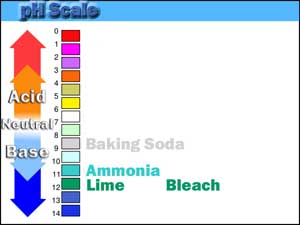Base Chemistry Facts
Posted by A. Douglas / in Science Facts

The pH Scale
BASE CHEMISTRY AND THE POWER OF HYDROGEN
- Base chemistry: In chemistry, a base is the opposite of an acid.
- On a pH scale (power of hydrogen), a substance measured less than a pH of 7 to 14 is considered a base.
- Litmus paper, which is made from a lichen plant, is used to test the pH of materials. Base chemistry materials will turn litmus paper blue in color.
- A base can neutralize an acid. A base changes to pH of an acid closer to 7 (neutral).
- A base neutralizes an acid by accepting hydrogen ions from the acid.
- The lower the pH, the more hydrogen ions contained in the acid.
- Each number change on a pH scale represents 10 times the amount of hydrogen ions. For example, a substance with a pH of 2 has 10 times as many hydrogen ions as a substance with a pH of 3.
- Common base substances include baking soda, lime, antacid tablets, bleach and ammonia.
- Laundry detergent and soaps are base chemistry materials.
- Sea water is a base with a pH generally between 7.5 and 8.5. Sea water contains salt (NaCl) which raises the pH above 7.
- When a base reacts with an acid two products always result, water and salt.
- A strong base that reacts well with acids is known as an alkali.
- People have a blood pH between 7.25 and 7.45.
- Lime is used as a base by farmers in soil to help neutralize acidic soil. Lime is also used by sanitary engineers to help increase the pH of acidic sewage.
- People use antacid tablets to neutralize an upset stomach which is generally caused by acid in the stomach.
- Bases conduct electricity well. Many disposable batteries store and conduct electricity through an alkali substance.
- Base chemistry materials corrode metals. This is why cars in cold regions or near the sea, which are exposed to salt water, often experience rust sooner than cars in warm, dry regions.
- Swimming pool pH is generally kept at a level that is slightly basic, from 7.2 to 7.8. This range of pH is more natural to the human body and helps keep the pool water clean through chlorination.

When asphalt is hot, a heavy roller can be used to compact and smooth the road surface.Old rollers where known as steam rollers because they were powered by a steam engine.
